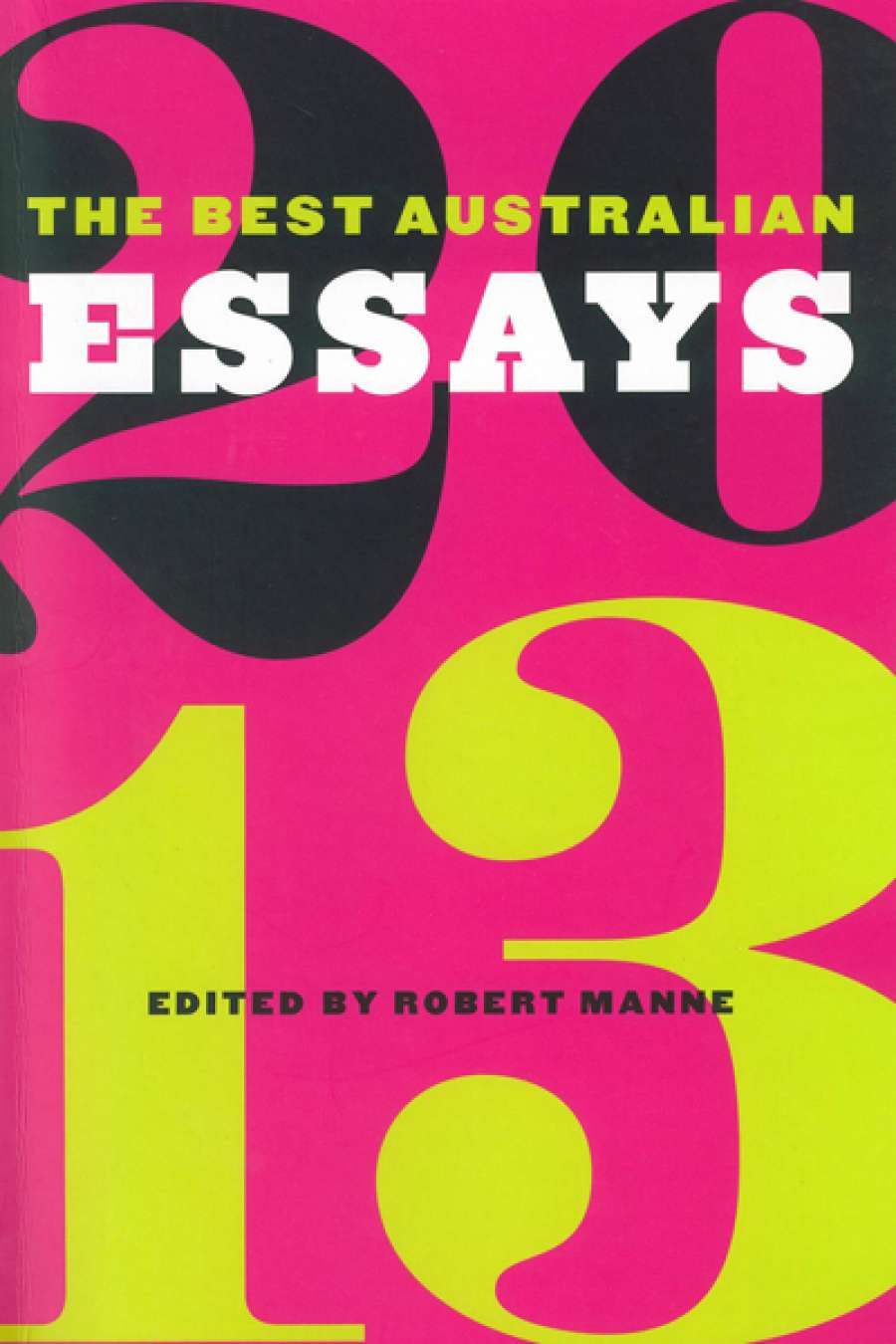
- Free Article: No
- Contents Category: Anthology
- Custom Article Title: Susan Lever on 'The Best Australian Essays 2013'
- Review Article: Yes
- Online Only: No
- Book 1 Title: The Best Australian Essays 2013
- Book 1 Biblio: Black Inc., $29.99 pb, 333 pp, 9781863956253
Manne has placed the essays in a structure, forming another narrative of his own, beginning with Kim Mahood’s engagement with the past, taking a group of Aboriginal people to visit their ancestral land – a place where a massacre has occurred – and trying to come to terms with her own responses. A dog features towards the end of this story, and dogs focus Rozanna Lilley’s bemused and exasperated consideration of her parents, Dorothy Hewett and especially Merv Lilley, in her ‘Catastrophic’. The collection then moves through the trials of high-school romance (and sexual abuse in the case of Hazel Dooney) in recollections by Dooney, Ali Alizadeh, and Robert Dessaix. It offers us a brief reacquaintance with Helen Garner’s writing, before moving to Kate Legge’s account of the Jill Meagher murder, written in the New Journalism style that Garner has favoured in her recent books.
The shift from these personal engagements with sexual or family crises and criminal events comes with Karen Hitchcock’s devastating argument about our attitudes to obesity. This is an essay proper – moving from Hitchcock’s experiences of obesity clinics and surgery to argue the case against ‘obesity-as-a-disease’ and to indict the manufacturers and promoters of those concoctions usually called ‘fast food’. When she talks about obesity, she is not referring to the fragile body image of teenage girls, or worrying about your middle-age spread. She is talking about people immobilised by their weight of fat, unable to live any kind of productive life and liable to die soon. From this point we shift to a series of pieces about words and language, culminating in J.M. Coetzee’s beautiful New York Review of Books essay on the fiction of Gerald Murnane. Coetzee manages to be both engaged and detached, seeking out the underlying patterns of Murnane’s philosophy while finding the strengths and gently touching on the weaknesses of his writing.
‘ ... an informative, thoroughly enjoyable collection of writing to stimulate our reflections on the past year and our concerns for the future.’
The collection moves on to consider other aspects of art: Murray Bail’s hilarious anecdotes about painters; Richard Flanagan’s profile of David Walsh and MONA; Mark McKenna’s wonderful account of the effect of national acclaim on Sibelius; Adrian Martin on European film; and David Free on Monty Python. This dovetails into Anna Goldsworthy’s affectionate, yet clear-eyed, memories of Christopher Pearson, and Guy Rundle’s valediction for a whole society living in London’s Soho. This mood sets up Julian Meyrick’s response to the death of Margaret Thatcher, forming an easy path to Chloe Hooper’s encounter with Julia Gillard in her last days and Pamela Williams on the prime ministership of Kevin Rudd.
The final essays look outward to Australia’s place in the wider political world: Christos Tsiolkas on our attitudes to asylum seekers; Martin Krygier on Poland and the Holocaust; Hugh White on our lack of rationale for the Afghanistan deployment; Alice Pung and Simon Leys on aspects of writing about Asia. Manne’s finale is a group of essays by Bill McKibben, Tim Flannery, and Julian Assange that will fill you with fear and despair about climate change, our damage to the planet, and the repressive nature of our governments.
If you are a reader of the Monthly and the Saturday newspapers, you are likely to be familiar with many of these essays, and you may think this book is in excess of your needs. Or you may turn away from the heavy reading task of the ‘essay’. You will be wrong. The Monthly pieces are a delight to reread, gaining new traction from their placement in the collection: Hooper’s analysis of the massive and mystifying obstructions to Julia Gillard’s progress meets Pamela Williams’s witty reflections on Kevin Rudd’s last days (from the Australian Financial Review). McKibben’s reminder that our commitment to coal exports may be fatal for human life on the planet sits beside Flannery’s review from the New York Review of Books of Lisa-ann Gershwin’s book on the rise of the jellyfish as a result of our interference in the marine world.
There are gems of wisdom and insight all through the collection: Tsiolkas on the divide between the cosmopolitan, educated inner cities and the parochial anxious communities of the urban fringes in Australia; Pung on the difficulty of writing stories that do not conform to the national success narrative; McKibben’s message that ‘the first rule of holes is that when you’re in one, you stop digging’.
So forget the title: this book serves as a brilliant reflection on the issues that have absorbed us over the past year or so, the problems we face for the future, and what it means to be alive – and thinking – in contemporary Australia. Perhaps, it might be retitled Manne’s Annual 2013, and Black Inc. could get him to do it every year. The material is so good that it might be a difficult act to follow, though.


Comments powered by CComment